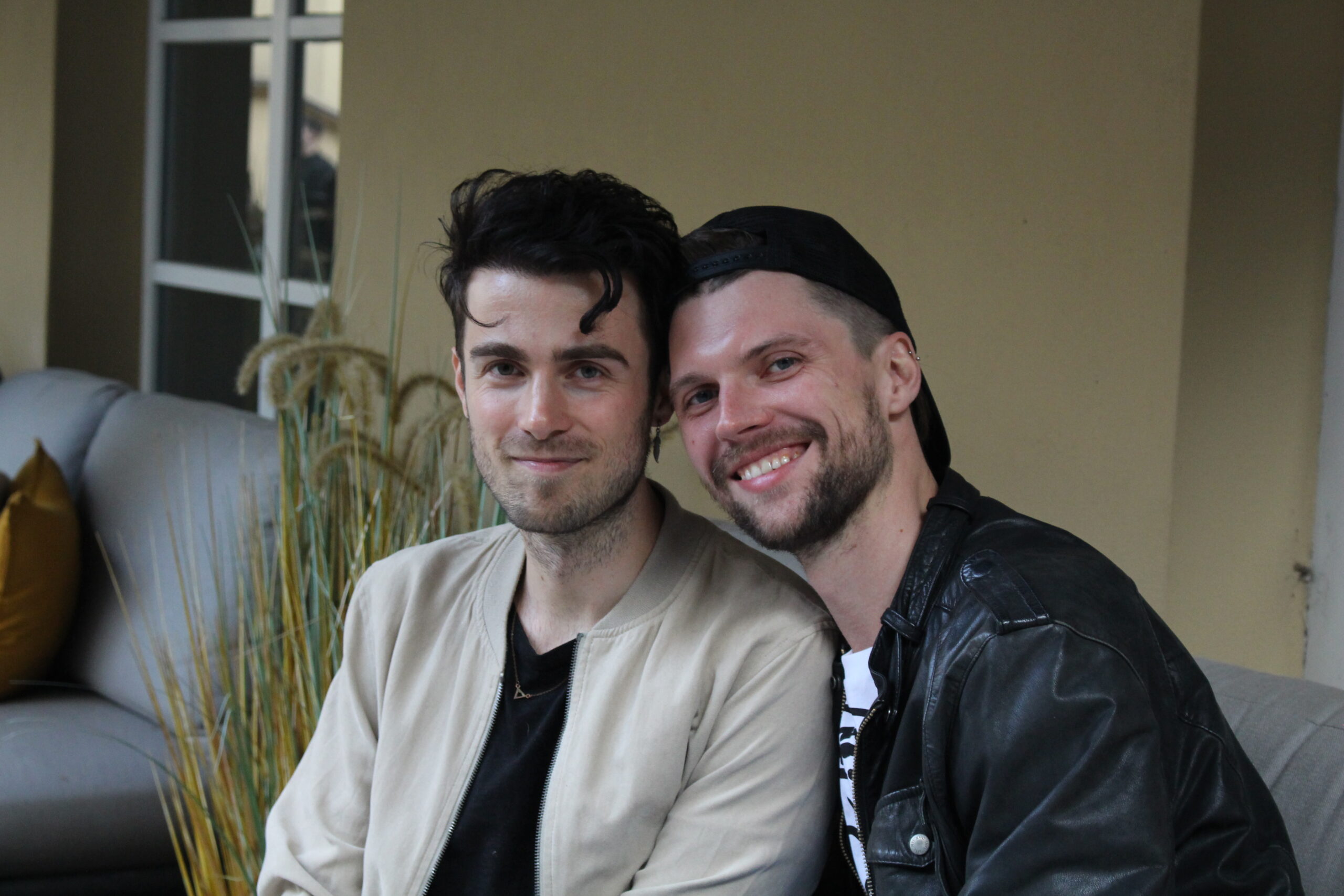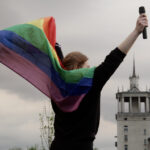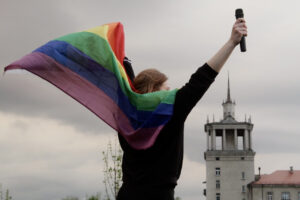
Photo: Marie Vandenhirtz
They both agree: The hardest part was school. “Nobody likes what’s going on at school. If you’re anyhow different. You don’t even have to be gay. I mean, I wasn’t out in high school, but I felt like they went behind my back and were giving this stupid kind of comments. I felt like I don’t deserve this shit,” Mantas Majauskas explains. He grew up in Vilnius and lived here all his life. “I didn’t share this with anybody. I didn’t even know with whom I could share it even with. I felt like it’s something out of my hands,” he adds. His husband Can Berk Cebeci, is from Istanbul, Turkey. “When it becomes visible, it makes it easier to come out. It would be more normal,” he says when asked about what would have made it easier. The two matched on Tinder when Mantas was visiting Istanbul in 2014. They didn’t get a chance to see each other back then but were committed to video call and visit each other after. Today they are married: “In January 2019 we got married in Denmark. Four months after Corona happened. Could you imagine, we must have waited so long,” Mantas reflects. A decision by the Court of Justice of the European Union in June 2018 makes it possible for same-sex couples to get married or declare their partnership in another EU country and get it recognized everywhere in the EU. Even in those countries where such a relationship is not set in the national law. When Mantas was dating before, he felt like he was always looking for a guy that was outside of Lithuania. Somewhere where same-sex couples were more acknowledged than in Lithuania. “When you look at what happened a few weeks ago, it might seem very conservative. But if you look at the whole decade, there has actually changed a lot already. But I still have that fear of being open in public. I don’t trust it that much. It’s very tiring – I don’t want to feel that way. I have those thoughts about going somewhere more western. But as long as things don’t go worse, I’m willing to give it a try here.” “Everybody went through so much. We spend so much energy hating everybody. Well, everybody deserves some rest. If the partnership bill would have been passed. That would be a bit traumatic for a little while and then everybody would see that nothing bad is happening. We are only turning into a better society.”

Photo: Marie Vandenhirtz
Domintas Liniauskas’ uncle went to the family march demonstration. “And I was actually curious why my mother didn’t go because I’m sure that my uncle tried to make her go. I asked her and she was like, “Oh, I don’t want to be on the opposite side. I don’t want to be against my son. But then she started sharing posts on Facebook of the organizers and liking all that stuff.” Domintas figured out he was “not straight” as he says when he was 16. There was no coming out to his friends “It was just kind of natural” and “They don’t really care about stuff like that. Most were already part of the community”. Today he identifies as Bi-Sexual. But it was different with his family: “I wanted to come out to them one morning before going to school. I was in the bathroom brushing my teeth, and my parents were just watching television. Something about gay people was up on the TV. And my dad was just like “They’re sick people. They’re ill people. We don’t care about them”. That wasn’t fun to hear. So, I didn’t and postponed the whole coming out. (…) Then I tried to come out to my mom, but it wasn’t a good experience basically. There was crying and everything. It was emotional. I’m fine talking about it, but it’s not something I’m very proud of or happy about. It seemed like my mom took it hard, but she was kind of accepting it. After a few months, she started acting as nothing happened at all. And that’s pretty much all that happened.” His mom studied religion to be a teacher. He would consider her as “heavily catholic”, even though she is only active at church occasionally. His dad, he explains, only goes along with it “he doesn’t want to upset my mom”. The relationship to his dad is not very close. They don’t talk much, and he never “came clean” about his identity to him. Today Domintas fears a new wave of people that are against LGBT right the most: “There has been a huge wave of, I would call them political influencers, people that push super conservative views.”
Video: Marie Vandenhirtz
“Personally, I was very religious. And I was quite homophobic because I grew up in that kind of atmosphere.” Today Ada Balčiūnaitė identifies as non-binary. “I came out to myself when I was around 15/16 years old. I started a new high school, and it was quite different from what I have known before. It was very open with a lot of queer people.” At that time Ada used to identify as a cis female lesbian. She/he says especially her/his mother struggled with the change: “I was very close with her. She is very religious, so naturally, I became religious as well. Today if we don’t talk about it, it’s quiet. But if we do, we always get into fights. So, we’re kind of tolerating each other.” As a chairperson of her/his University LGBT group, Ada became public and vocal on protests and events. “I am the person that does not like to hide.” She/He beliefs that that also shows in the safety of her/his daily life: “I do feel unsafe. The least of my worries are probably the name-calling. But also, because I present as a more masculine person. I fear that there is a chance that someone could try to beat me up. And yes, I could look safer, but I also don’t want to.” “No one is ever ready for social change. It is always quite loud with all the protests and violence and all that. So, I think it’s just a question if we can pass this change. Personally, I’m still kind of on the fence. Because yes, I want to stay here and work so that our children and grandchildren have a better future. But on the other hand, I also want to think about my personal happiness. And I kind of just feel like I want to immigrate to a more open country. So that me being queer will not be such a big deal. Because you get tired of being a political statement.” “And to change people’s mind… if I could grow out of it, and get rid of it, then maybe someone else could. On the other hand, these are adult people who should know better. And I don’t know, probably something traumatic could change their minds, like the suicide of their child or something like that. But past that kind of dramatic experience, very few people change their minds”.

Photo: Marie Vandenhirtz
“But Artūras, you could be such a good father,” was his mother’s response when she finally confronted Artūras Rudomanskis with his coming out as gay in 2007. “It was not easy for me to come out. I was shaking.” With the entrance to the EU in 2004, Lithuania also adopted the Anti-Discrimination law. At that time Artūras studied in Switzerland. He wrote complaints about hate speech against LGBT people on an online platform. Finally, the cases to those accusations were opened following a media interest. “They asked if I want to tell them about why I wrote those complaints. I remember asking my friend if I should give them an interview or not.” His friend finally convinced him to do the interview, which could have resulted in a public coming out. “In the end, I didn’t come out in the interview, but I was shown in all News in Lithuania. And when I returned after my studies, my mom was pretending that nothing happened. But at the end of the day – I think we were watching a movie – she couldn’t keep it to herself.” Since then, Artūras has been an activist within the LGBT community. Working in politics, law but also organizing LGBT events. He draws the homophobic attitude of some Lithuanians back to soviet history. “After the Soviet Union, that conservative agenda was taken by the church. And the Church in Lithuania is quite strong.” “Maybe we need NATO, the EU and other security institutions to say, that homophobia is one of the threats for national security. That would be a great change”.

Photo: Marie Vandenhirtz
“My mom doesn’t want my sister to hear about that stuff. And that Is kind of hard,” Milda Matuzonytė says. Her voice breaks. You can tell it is touching her. “When I first saw the term (A-Sexual) and the definition, I immediately knew that this was me. But for some reason, I just ignored it and put it in the corner of my brain.” Since her coming out to her mom, she says the situation within her family has changed completely. “My friends organized a protest; it got some media attention, and I went there. That was when I realized it’s time to confront my feelings and came out to my mom. She’s very Christian. She blamed a lot of stuff. Like our family situation, the relationship between my friends. After that we didn’t talk for a month, now we are ignoring it most of the time. But sometimes it comes up in an argument.” Today Milda sees a therapist to cope with her feelings. “My mom thought a therapist would change my identity. But now I have a therapist, that is very supportive and understands. So, it’s kind of a payback to her.” What would have made it easier for her she says, would be education: “Because at school, it’s not really talked about anywhere. Also, we only have one member of Parliament, and all the hate is directed towards him. So maybe more representation in the government would be nice.”

Photo: Marie Vandenhirtz
Paulius Ambrazevičius says he’s been an LGBT supporter all his life. It was hard, he says. Because he grew up in a small village in a post-soviet country. But even before he became well known as a comedian, quiz master and writer, he knew that it was wrong to discriminate against people because of their identity. Today he tries to support LGBT rights wherever he can. Goes to the Baltic Pride or hosts LGBT events. “Sometimes I just get so tired, the last two weeks or so, I haven’t written anything. It just gets so exhausting. (..) But when someone of the community wants to say something, I’m always there to help.” Even the engagement to his wife, which got media attention, didn’t go without LGBT support: “I asked my wife: Is it alright if I say that we will get married when everyone will be able to marry in Lithuania? She said, “Yes please do that!” But we didn’t wait until that. Because it would have been too long.” Another anecdote he likes to share is a conversation his wife had on Facebook: “In Lithuanian language, we have that ending for your last name as a wife that shows who your husband is. And my wife got into an argument online, where someone said, “no one cares who they are sleeping with, why should they show it off” and my wife said: your last name ends with -ienė, you are showing who you’re sleeping with.” “It is easy to blame the soviet past, but there was no sexual revolution – no sex in the Soviet Union,” he answers when asking him about the reasons for those conservative thoughts. Today his hopes lie with the new generation. A generation that he claims is growing up in a more western surrounding.




